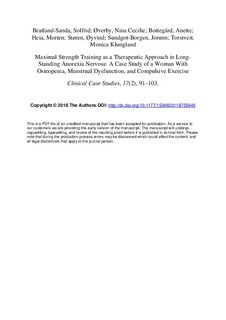| dc.contributor.author | Bratland-Sanda, Solfrid | |
| dc.contributor.author | Øverby, Nina Cecilie | |
| dc.contributor.author | Bottegård, Anette | |
| dc.contributor.author | Heia, Morten | |
| dc.contributor.author | Støren, Øyvind | |
| dc.contributor.author | Sundgot-Borgen, Jorunn | |
| dc.contributor.author | Torstveit, Monica Klungland | |
| dc.date.accessioned | 2019-03-26T12:45:39Z | |
| dc.date.available | 2019-03-26T12:45:39Z | |
| dc.date.created | 2018-07-30T16:52:42Z | |
| dc.date.issued | 2018 | |
| dc.identifier.citation | Clinical Case Studies. 2018, 17 (2), 91-103. | nb_NO |
| dc.identifier.issn | 1534-6501 | |
| dc.identifier.uri | http://hdl.handle.net/11250/2591806 | |
| dc.description.abstract | In persons with anorexia nervosa (AN), compulsive exercise and osteopenia are common symptoms. Although treatment of osteopenia besides weight regain is lacking, maximal strength training (MST) has been found to be effective in other populations. Such training has not been prescribed to those with AN due to uncertainty of tolerance. We therefore examined use of MST in a woman with long-standing AN, osteopenia, menstrual dysfunction, and compulsive exercise. The MST intervention consisted of four exercises: three sets of five repetitions maximum (RM), 3 times per week for 16 weeks. We examined muscle strength, bone mineral density (BMD), AN psychopathology, and compulsive exercise at baseline, posttest, and 6-month follow-up. Attendance rate was 100%. The subject improved muscle strength by 20% to 40%. BMD in lumbar spine improved by 4% to posttest, and by 8% from baseline to 6-month follow-up. The BMD T-scores shifted from values classified as osteopenic to normal values throughout the course of the intervention, despite continuance of menstrual dysfunction and lack of weight gain. No changes in AN psychopathology or levels of compulsive exercise were detected. Perceived psychological benefits including new bodily experiences were self-reported by the subject, emphasizing the importance of close follow-up by competent instructors. | nb_NO |
| dc.language.iso | eng | nb_NO |
| dc.title | Maximal Strength Training as a Therapeutic Approach in Long-Standing Anorexia Nervosa: A Case Study of a Woman With Osteopenia, Menstrual Dysfunction, and Compulsive Exercise | nb_NO |
| dc.type | Journal article | nb_NO |
| dc.type | Peer reviewed | nb_NO |
| dc.description.version | acceptedVersion | nb_NO |
| dc.source.pagenumber | 91-103 | nb_NO |
| dc.source.volume | 17 | nb_NO |
| dc.source.journal | Clinical Case Studies | nb_NO |
| dc.source.issue | 2 | nb_NO |
| dc.identifier.doi | 10.1177/1534650118755949 | |
| dc.identifier.cristin | 1599050 | |
| cristin.unitcode | 222,59,4,0 | |
| cristin.unitname | Institutt for friluftsliv, idrett og kroppsøving | |
| cristin.ispublished | true | |
| cristin.fulltext | postprint | |
| cristin.qualitycode | 1 | |
